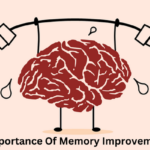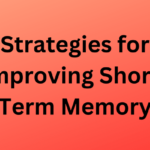How to Overcome Forgetfulness: Practical Strategies for a Sharper Memory
How to Overcome Forgetfulness: Tips include regular exercise, sleep, and a balanced diet. Practice mindfulness and use memory aids like lists and reminders. Seek medical advice for persistent issues.

Introduction
Forgetfulness can be a common and frustrating experience for many individuals, impacting various aspects of daily life. Whether it’s forgetting where you placed your keys or struggling to recall important information during a conversation, memory lapses can be concerning. However, with the right strategies and lifestyle changes, it’s possible to overcome forgetfulness and improve memory function.
In this comprehensive guide, we’ll delve into the science behind memory, explore the common causes of forgetfulness, and provide practical strategies to help you sharpen your memory and prevent memory loss.
Understanding Forgetfulness
Forgetfulness is a natural part of the human experience, but it’s essential to differentiate between normal memory lapses and more serious cognitive issues. Occasional forgetfulness, such as forgetting someone’s name or where you parked your car, is typical and often a result of distractions or stress. However, persistent memory problems that interfere with daily functioning may indicate underlying issues that require attention.
Factors Contributing to Forgetfulness
Several factors can contribute to forgetfulness, including:
- Age-Related Memory Decline: As we age, changes in the brain’s structure and function can lead to mild cognitive impairment and memory loss.
- Stress and Anxiety: High levels of stress and anxiety can impair memory retrieval and processing, making it difficult to recall information.
- Lack of Sleep and Fatigue: Sleep plays a crucial role in memory consolidation, and inadequate sleep can lead to impaired cognitive function and memory problems.
- Poor Nutrition and Lifestyle Habits: A diet lacking in essential nutrients, along with sedentary lifestyle habits, can negatively impact brain health and memory function.
The Science Behind Memory
To understand how to improve memory, it’s essential to grasp the fundamental principles of memory formation and retention.
How Memory Works
Memory involves three main processes: encoding, storage, and retrieval. During encoding, information is processed and stored in the brain. Storage refers to the retention of encoded information over time, while retrieval involves accessing and recalling stored memories when needed.
Boost Focus Today: Elevate brainpower with the ancient Himalayan secret – enhance memory and mental performance. Click Here for details
Types of Memory
There are several types of memory, including:
- Short-Term Memory: Short-term memory stores information temporarily and has limited capacity.
- Long-Term Memory: Long-term memory stores information for extended periods, allowing for the retrieval of past experiences and knowledge.
- Working Memory: Working memory enables the temporary storage and manipulation of information needed for cognitive tasks.
Brain Regions Involved in Memory
Memory formation and retrieval involve various regions of the brain, including the hippocampus, amygdala, and prefrontal cortex. These brain structures work together to encode, store, and retrieve memories, playing critical roles in cognitive function and learning.
Common Causes of Forgetfulness
Understanding the underlying causes of forgetfulness can help identify strategies for prevention and improvement.
Stress and Its Impact on Memory
Chronic stress can have detrimental effects on brain health and memory function. When the body is under stress, the release of stress hormones like cortisol can impair memory retrieval and cognitive performance. Additionally, prolonged stress can contribute to anxiety and depression, further exacerbating memory problems.

Sleep Deprivation and Memory Impairment
Adequate sleep is essential for cognitive function and memory consolidation. During sleep, the brain processes and consolidates newly acquired information, facilitating memory formation. Sleep deprivation disrupts this process, leading to impaired cognitive function, decreased attention span, and memory lapses.
Poor Diet and Cognitive Function
Nutrition plays a crucial role in brain health and cognitive function. A diet rich in fruits, vegetables, whole grains, and healthy fats provides essential nutrients that support brain function and memory retention. Conversely, a diet high in processed foods, sugar, and unhealthy fats can impair cognitive function and increase the risk of memory loss.
Lifestyle Factors and Cognitive Health
In addition to stress and nutrition, lifestyle factors such as physical activity and social engagement also influence cognitive health and memory function. Regular exercise promotes blood flow to the brain, stimulates the growth of new brain cells, and enhances memory and learning. Similarly, engaging in social activities and maintaining meaningful social connections can support brain health and reduce the risk of cognitive decline.
Practical Strategies to Overcome Forgetfulness
Lifestyle Changes
Making simple lifestyle changes can have a significant impact on memory and cognitive function:
- Prioritize Sleep: Aim for 7-9 hours of quality sleep each night to support memory consolidation and cognitive function.
- Exercise Regularly: Engage in aerobic exercise, strength training, or yoga to promote brain health and improve memory.
- Eat a Brain-Healthy Diet: Consume a balanced diet rich in fruits, vegetables, whole grains, lean protein, and omega-3 fatty acids to support cognitive function and memory retention.
- Manage Stress: Practice stress-reduction techniques such as meditation, deep breathing exercises, or mindfulness to reduce the negative effects of stress on memory and cognitive function.
Cognitive Techniques
Incorporate cognitive strategies to enhance memory and mental acuity:
- Use Mnemonic Devices: Mnemonic techniques such as acronyms, visualization, and association can help improve memory retention and recall.
- Practice Mindfulness: Stay present and focused in daily activities to enhance attention and memory performance.
- Chunk Information: Break down complex information into smaller, more manageable chunks to facilitate memory encoding and retention.
- Engage in Brain-Stimulating Activities: Challenge your brain with puzzles, crosswords, memory games, or learning new skills to promote cognitive function and memory improvement.
Organization and Time Management
Implement organizational strategies to keep your mind sharp and focused:
- Use Calendars and Planners: Keep track of appointments, deadlines, and tasks using digital or paper-based calendars and planners.
- Create To-Do Lists: Prioritize tasks and create daily or weekly to-do lists to stay organized and focused.
- Establish Routines: Develop consistent routines and habits to reinforce memory cues and improve overall cognitive function.

Seeking Professional Help
If forgetfulness persists or worsens despite lifestyle modifications, consider seeking professional evaluation and assistance:
- Consult with a Healthcare Professional: Discuss your concerns with a healthcare provider or cognitive specialist to rule out underlying medical conditions or cognitive disorders.
- Undergo Cognitive Assessments: Participate in cognitive assessments and memory tests to evaluate memory function and identify areas of improvement.
- Explore Treatment Options: Explore potential treatment options, including medication, cognitive therapy, or lifestyle interventions tailored to your specific needs.
Case Studies and Personal Experiences
Real-life examples and personal anecdotes can provide valuable insights and motivation for overcoming forgetfulness:
Case Study 1:
- Name: Sarah
- Age: 45
- Background: Sarah experienced frequent memory lapses and difficulty concentrating due to work-related stress and sleep deprivation.
- Intervention: With guidance from a healthcare professional, Sarah implemented stress-reduction techniques, improved her sleep hygiene, and adopted a brain-healthy diet.
- Outcome: Within weeks, Sarah noticed significant improvements in her memory, concentration, and overall well-being, allowing her to perform better at work and enjoy a more fulfilling life.
Case Study 2:
- Name: John
- Age: 60
- Background: John struggled with age-related memory decline and cognitive impairment, leading to frustration and anxiety.
- Intervention: Through regular exercise, cognitive training, and social engagement, John was able to enhance his memory, cognitive function, and quality of life.
- Outcome: Despite facing challenges associated with aging, John regained confidence in his cognitive abilities and continued to lead an active and fulfilling lifestyle.
Conclusion
Forgetfulness is a common experience that can impact individuals of all ages. By understanding the underlying causes of forgetfulness and implementing practical strategies to support brain health and memory function, it’s possible to overcome memory loss and improve cognitive performance. Remember, small lifestyle changes can make a big difference in preserving and enhancing your memory.
Take proactive steps to prioritize sleep, manage stress, engage in brain-stimulating activities, and seek professional assistance if needed. With dedication and persistence, you can sharpen your memory, stop forgetting, and enjoy a more vibrant and fulfilling life.
Additional Resources
- Books:
- “Moonwalking with Einstein: The Art and Science of Remembering Everything” by Joshua Foer
- “The Brain Fog Fix: Reclaim Your Focus, Memory, and Joy in Just 3 Weeks” by Mike Dow
- Websites:
- Apps:
- Lumosity
- Elevate
- Tools:
- Memory Palace Technique
- Spaced Repetition Software
Remember, improving memory is a journey that requires patience, persistence, and a commitment to lifelong learning and self-care. Embrace the journey, and enjoy the benefits of a sharper memory and a brighter future!




